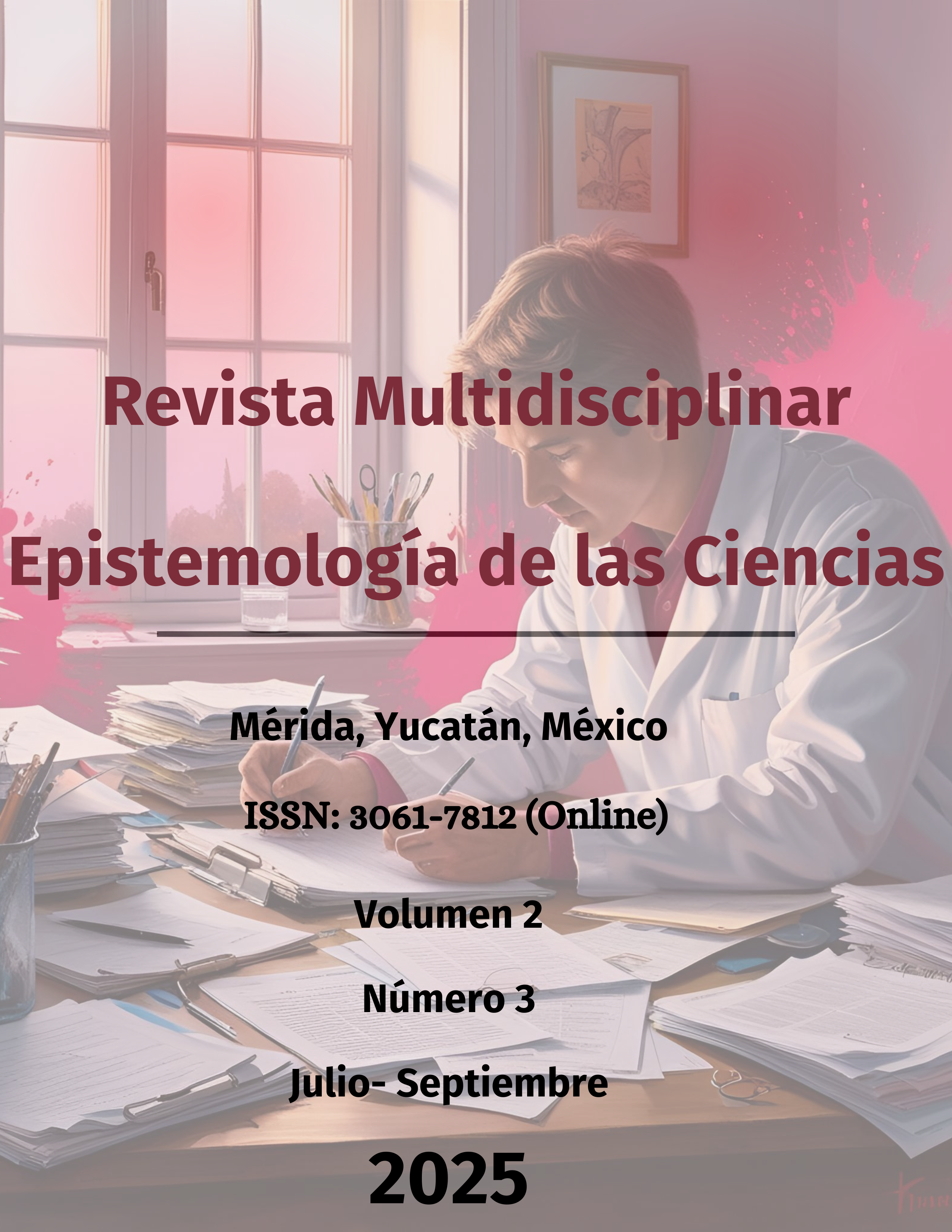Ecosistemas Visuales y Juventud Verde en el Consumo Sostenible Digital
DOI:
https://doi.org/10.71112/f7hqkq17Palabras clave:
sostenibilidad, juventud, redes, consumo, ecologíaResumen
Este estudio analiza comunidades digitales de consumo sostenible en Ecuador, centrado en Instagram (67,2 %) y TikTok (23,4 %), con predominio de jóvenes menores de 25 años. Mediante un cuestionario a 1967 participantes y análisis cuantitativo, identifica patrones de participación, interacción y tensiones entre viralidad emocional y profundidad crítica en la comunicación ecológica. Se concluye que la sostenibilidad digital es un fenómeno visual, generacional y comunitario, esencial para diseñar estrategias comunicativas y educativas eficaces, y destaca la importancia de futuras investigaciones cualitativas para profundizar en las motivaciones compartidas
Descargas
Referencias
Barabási, A.-L. (2003). The new science of networks. Journal of Artificial Societies and Social Simulation, 6. https://doi.org/10.2307/20033300 DOI: https://doi.org/10.2307/20033300
Carrete, L., Castaño, R., Felix, R., Centeno, E., & González, E. (2012). Green consumer behavior in an emerging economy: Confusion, credibility, and compatibility. Journal of Cleaner Production, 39, 1–9. https://doi.org/10.1016/j.jclepro.2012.05.021 DOI: https://doi.org/10.1016/j.jclepro.2012.05.021
Carrington, M. J., Neville, B. A., & Whitwell, G. J. (2014). Lost in translation: Exploring the ethical consumer intention–behavior gap. Journal of Business Research, 67(1), 2759–2767. https://doi.org/10.1016/j.jbusres.2012.09.022 DOI: https://doi.org/10.1016/j.jbusres.2012.09.022
Choi, S., & Lee, H. (2022). Social media and sustainable consumption: A systematic review. Sustainability, 14(1), 456. https://doi.org/10.3390/su14010456 DOI: https://doi.org/10.3390/su14010456
Comunicar. (2016). Revista Comunicar, 48. https://www.revistacomunicar.com/index.php?contenido=revista&numero=48
De Veirman, M., Cauberghe, V., & Hudders, L. (2017). Marketing through Instagram influencers: The impact of number of followers and product divergence on brand attitude. International Journal of Advertising, 36(5), 798–828. https://doi.org/10.1080/02650487.2017.1348035 DOI: https://doi.org/10.1080/02650487.2017.1348035
Diddi, S., & Niehm, L. S. (2016). Corporate social responsibility in the retail apparel context: Exploring consumers’ personal and normative influences on patronage intentions. Journal of Marketing Channels, 23(1–2), 60–76. https://doi.org/10.1080/1046669X.2016.1166357 DOI: https://doi.org/10.1080/1046669X.2016.1147892
Duffy, B. E., & Hund, E. (2019). Gendered visibility on social media: Navigating Instagram’s authenticity bind. International Journal of Communication, 13, 4983–5002. https://ijoc.org/index.php/ijoc/article/view/11271
Echegaray, F., & Hansstein, F. V. (2017). Assessing the intention–behavior gap in electronic waste recycling: The case of Brazil. Journal of Cleaner Production, 142(1), 180–190. https://doi.org/10.1016/j.jclepro.2016.05.064 DOI: https://doi.org/10.1016/j.jclepro.2016.05.064
Gentina, E., & Rowe, F. (2020). Effects of materialism on consumption behavior: A meta-analysis. Journal of Business Research, 118, 384–393. https://doi.org/10.1016/j.jbusres.2020.08.017 DOI: https://doi.org/10.1016/j.jbusres.2020.08.017
Gentina, E., & Singh, P. (2015). How national culture and parental style affect the process of adolescents’ ecological resocialization. Journal of Business Research, 68(3), 803–810. https://doi.org/10.1016/j.jbusres.2014.09.006 DOI: https://doi.org/10.1016/j.jbusres.2014.09.006
Hwang, J., & Kim, H. (2020). Social media as a tool for sustainable consumption: A systematic literature review. Sustainability, 12(23), 10125. https://doi.org/10.3390/su122310125 DOI: https://doi.org/10.3390/su122310125
Kapitan, S., Kennedy, A.-M., & Berth, N. (2019). Sustainably empowering consumers: The role of social media. Journal of Business Research, 100, 210–218. https://doi.org/10.1016/j.jbusres.2018.10.035 DOI: https://doi.org/10.1016/j.jbusres.2018.10.035
Kim, H., & Kim, Y. (2021). The role of social media in promoting sustainable consumption: A review. Sustainability, 13(4), 2134. https://doi.org/10.3390/su13042134 DOI: https://doi.org/10.3390/su13042134
Kumar, A., & Smith, S. (2018). Understanding local food consumers: Theory of planned behavior and segmentation approach. Journal of Food Products Marketing, 24(2), 196–215. https://doi.org/10.1080/10454446.2017.1266554 DOI: https://doi.org/10.1080/10454446.2017.1266553
Leal Filho, W., Salvia, A. L., & Pretorius, R. W. (2019). The role of social media in promoting sustainable consumption. Sustainability, 11(20), 5682. https://doi.org/10.3390/su11205682 DOI: https://doi.org/10.3390/su11205682
Lee, K. (2008). Opportunities for green marketing: Young consumers. Marketing Intelligence & Planning, 26(6), 573–586. https://doi.org/10.1108/02634500810902839 DOI: https://doi.org/10.1108/02634500810902839
Lim, W. M. (2017). Inside the sustainable consumption theoretical toolbox: Critical concepts for sustainability, consumption, and marketing. Journal of Business Research, 78, 69–80. https://doi.org/10.1016/j.jbusres.2017.05.024 DOI: https://doi.org/10.1016/j.jbusres.2017.05.001
Lou, C., & Yuan, S. (2019). Influencer marketing: How message value and credibility affect consumer trust of branded content on social media. Journal of Interactive Advertising, 19(1), 58–73. https://doi.org/10.1080/15252019.2018.1533501 DOI: https://doi.org/10.1080/15252019.2018.1533501
Lu, L.-C., Chang, H.-H., & Chang, A. (2015). Consumer personality and green buying intention: The mediating roles of social influence and green consumption attitude. International Journal of Consumer Studies, 39(6), 538–548. https://doi.org/10.1111/ijcs.12205 DOI: https://doi.org/10.1111/ijcs.12205
Martínez, L., & Fernández, M. (2020). Redes sociales y sostenibilidad: Análisis de la comunicación ambiental en Instagram. Revista Latina de Comunicación Social, 75, 1–21. https://doi.org/10.4185/RLCS-2020-1453 DOI: https://doi.org/10.4185/RLCS-2020-1453
McNeill, L., & Moore, R. (2015). Sustainable fashion consumption and the fast fashion conundrum: Fashionable consumers and attitudes to sustainability in clothing choice. International Journal of Consumer Studies, 39(3), 212–222. https://doi.org/10.1111/ijcs.12169 DOI: https://doi.org/10.1111/ijcs.12169
Morais, D., & Pinto, M. (2023). Green communication and social media: A systematic review. Journal of Cleaner Production, 408, 135420. https://doi.org/10.1016/j.jclepro.2022.135420 DOI: https://doi.org/10.1016/j.jclepro.2022.135420
Naderi, I., & Van Steenburg, E. (2018). Me first, then the environment: Young Millennials as green consumers. Young Consumers, 19(3), 280–295. https://doi.org/10.1108/YC-08-2017-00722 DOI: https://doi.org/10.1108/YC-08-2017-00722
Papacharissi, Z. (2015). Affective publics and structures of storytelling: Sentiment, events and mediality. Information, Communication & Society, 19(3), 307–324. https://doi.org/10.1080/1369118X.2014.989252 DOI: https://doi.org/10.1080/1369118X.2015.1109697
Park, H., & Lin, L. M. (2020). Exploring attitude–behavior gap in sustainable consumption: Comparison of recycled and upcycled fashion products. Journal of Business Research, 117, 623–628. https://doi.org/10.1016/j.jbusres.2020.06.051 DOI: https://doi.org/10.1016/j.jbusres.2018.08.025
Peattie, K., & Crane, A. (2005). Green marketing: Legend, myth, farce or prophesy? Qualitative Market Research: An International Journal, 8(4), 357–370. https://doi.org/10.1108/13522750510619733 DOI: https://doi.org/10.1108/13522750510619733
Piñeiro-Naval, V., & Mangana, R. (2021). Activismo ambiental juvenil en redes sociales: El caso de Fridays For Future. Comunicar, 29(68), 1–10. https://doi.org/10.3916/C68-2021-01 DOI: https://doi.org/10.3916/C68-2021-01
Reilly, A. H., & Hynan, K. A. (2014). Corporate communication, sustainability, and social media: It’s not easy (really) being green. Business Horizons, 57(6), 747–758. https://doi.org/10.1016/j.bushor.2014.07.008 DOI: https://doi.org/10.1016/j.bushor.2014.07.008
Suki, N. M. (2016). Green product purchase intention: Impact of green brands, attitude, and knowledge. British Food Journal, 118(12), 2893–2910. https://doi.org/10.1108/BFJ-06-2016-0295 DOI: https://doi.org/10.1108/BFJ-06-2016-0295
Thøgersen, J. (2014). Unsustainable consumption: Basic causes and implications for policy. European Psychologist, 19(2), 84–95. https://doi.org/10.1027/1016-9040/a000176 DOI: https://doi.org/10.1027/1016-9040/a000176
Publicado
Número
Sección
Licencia
Derechos de autor 2025 Revista Multidisciplinar Epistemología de las Ciencias

Esta obra está bajo una licencia internacional Creative Commons Atribución 4.0.








